What's the Answer? - Create
What's the Answer? - Create
What's the Answer? - Create
Create successful ePaper yourself
Turn your PDF publications into a flip-book with our unique Google optimized e-Paper software.
Age• Age – not being 18 can limit what you can access as permission is required, or <strong>the</strong> service onlytargets specific age groups.Disadvantage due to care background• Penalties imposed upon young people by <strong>the</strong> ‘system’ which would be much less likely to havebeen incurred (or possibly, have less detrimental impact) if <strong>the</strong> young people did not have out-ofhomecare experience. This is in part attributed by <strong>the</strong>m, to <strong>the</strong> likelihood of young people lackingadequate supports (such as parental or family financial support) as a consequence of <strong>the</strong>ir ChildProtection history and/or out-of-home care.Specialised Services and Mainstream ServicesSpecialised services• Specialised services were seen to: offer connection – including social connection – to people with similar life experiences promote acceptance and belonging to young people who may feel like <strong>the</strong>y’re not <strong>the</strong> only onewhose been in care offer service staff who would ‘get me’ and understand <strong>the</strong> implications of lived careexperience, because <strong>the</strong>y deal with those implications and experiences daily: we have manydifferent issues to young people who haven’t been in care attract adequate resources to provide effective services – as <strong>the</strong> special needs of young peoplepost-care were seen to be more onerous (and likely to be unsupported by mainstreamservices) have <strong>the</strong> ability to make a dramatic difference to my lives and situations given <strong>the</strong> service’sability to address care related issues with <strong>the</strong> young person. There should be a one stop shopwhich young people could access prior to leaving care to begin to identify needs and accessrequired information (this may include entitlements for leaving care plans or information ono<strong>the</strong>r services) and begin process of referrals etc. This is necessary as caseworkers tend not towork closely with this age group and <strong>the</strong>y are not yet able to access after care services. be different for everyone. I like going to CREATE because it makes me feel comfortable to bearound o<strong>the</strong>r people who have <strong>the</strong> same experiences.• Specialised services attracted criticism because: <strong>the</strong>re’s a huge stigmatisation / discrimination in that attending specialist services can attract anegative stigma which young people leaving care would be completely ‘over’ after getting outof State care it may have a negative outcome when trying to secure mainstream housing and jobs, through<strong>the</strong> prejudice placed upon us by <strong>the</strong> wider community in regards to trust, stability and abilityto function when it comes to health and getting a job, I want to just be around everyday people it makes us look different when we have to go to a “special” service tailor made for us <strong>the</strong>re’s definitely a stigma <strong>the</strong>re, that is why I prefer a mainstream service but it is also apersonal thing. Everyone is different.28




![pdf [107kB] - Department of Families, Housing, Community Services](https://img.yumpu.com/51272499/1/190x245/pdf-107kb-department-of-families-housing-community-services.jpg?quality=85)
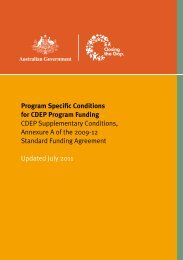
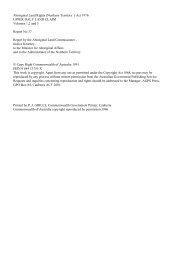
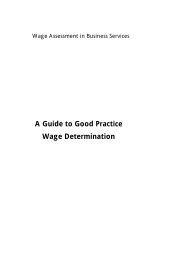

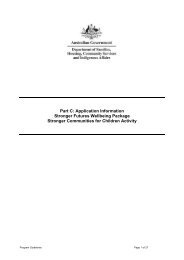
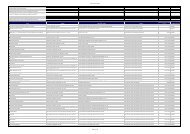
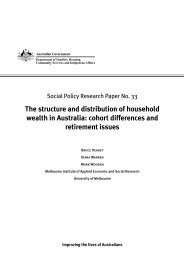
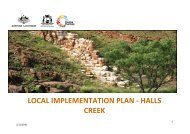
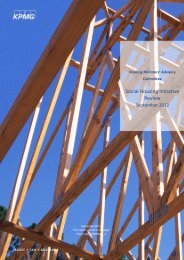
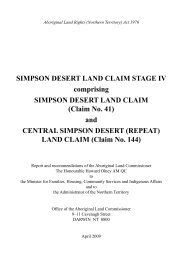
![Land Claim - pdf [278kB] - Department of Families, Housing ...](https://img.yumpu.com/47002639/1/184x260/land-claim-pdf-278kb-department-of-families-housing-.jpg?quality=85)
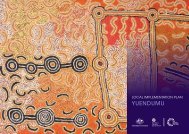
![Borroloola Land Claim - pdf [299kB] - Department of Families ...](https://img.yumpu.com/46103973/1/184x260/borroloola-land-claim-pdf-299kb-department-of-families-.jpg?quality=85)